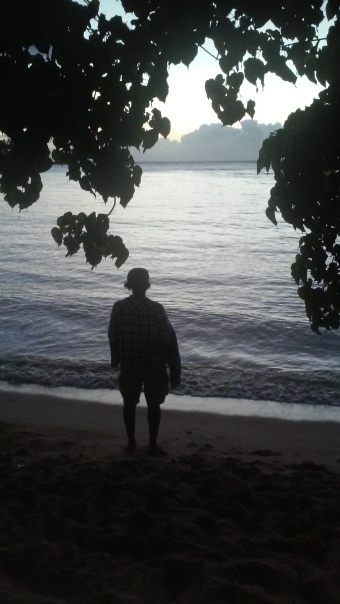“Caring for myself is not self-indulgence.
It is self-preservation and that is an act of political warfare.”–Audre Lorde, from A Burst of Light, Essays.

I am back from Oahu. I am fortunate to have had the opportunity to spend the time in close companionship with my love Joy. We talked and laughed and processed and cried and swam and hiked and snorkeled and bodyboarded and cuddled and cooked and ate and sang and celebrated and meditated and took pictures and read my journal from the POC meditation retreat and read aloud to each other from Octavia’s Brood: Science Fiction Stories from Social Justice Movements.
We felt big feelings. We held onto each other while feelings were felt. We fed our souls on the ocean and the sky and the wind and the rock and the sand. We fed our souls on visionary Afro-futurist fiction. We fed our souls on each other.
Inspired by a story in Octavia’s Brood, we considered writing letters from Joy and me post-capitalism to Joy and me during capitalism, the two of us here in the present day who could use some hope that a better future is possible.
We considered the deaths of John Crawford and Michael Brown. We considered the history of the Black Lives Matter Movement. Joy dissertated. I applied to the Practice in Transformative Action Program at the East Bay Meditation Center, trying to put words to my beliefs about social justice, about how change takes place, about my vision for a just and peaceful future. Joy read Twitter newsfeeds, taking in what was happening in Ferguson and telling me about the protests, about the gunshots, about the arrests. We alternated using our hands and our thumbs and our smartphones and our hearts and our guts to write posts about race on Facebook, to dialogue and discourse, to do the work of learning, of educating, of honesty. We tried to understand the role of rest in social justice work, the necessity of replenishment, the investment in self-care that makes the lifelong work sustainable.
We rested. We replenished. We invested in self-care.
We sang on the anniversary of Michael Brown’s death. We sang “Ella’s Song,” the Sweet Honey in the Rock Song that goes: “We who believe in freedom cannot rest until it comes. Until the killing of black men, black mother’s sons, is as important as the killing of white men, white mother’s sons, We who believe in freedom cannot rest….” The whole song is a manual for revolution. We redefined “cannot rest,” as cannot quit, because rest, regeneration, and replenishment must be part of our revolution, because we must find a way to sustain ourselves through action that will require generations of collective and committed effort. We expressed our continued intention to dedicate our time, energy, effort, action, and heart to vital and necessary work towards social justice and equity. We took a moment of silence. We sang, “I can hear my brother saying ‘I can’t breathe. Now, I’m in the struggle saying ‘I can’t leave. Calling out the violence of these racist police. We ain’t gonna stop ’til our people are free. We ain’t gonna stop ’til our people are free,” dropping flowers into the river and sand, a commitment ceremony. We recommitted ourselves to the movement.
Today, we talked about hopelessness. The truth is that I do not have faith that change is possible. When I look at the civil rights movements of the 1960s and consider that the words that James Baldwin wrote in The Fire Next Time could have been written today, rather than in the 1960s, I have little faith that we are moving in a positive direction. Yet, I must continue to hold onto hope, beyond all reason, beyond all evidence that there is any cause for hope. Not because I have faith that change will come but because if we give in to hopelessness, we will cease to work towards change and then, for sure, change will never come. If we lose hope, we will not resist, because we will not believe that there is any point to resistance. We will give in. If we give in, racism wins.
Hopelessness is not an option. Resistance is mandatory.
People are dying in the streets, in their homes, in their playgrounds, in their stores, in their places of worship, because of racism. We must continue to protest, to find the ways in our lives that we can work towards changing this reality, to care for the people who are suffering the most oppression, to educate those we love and those we don’t love, to create visions of the world we want to live in and take real and practical actions, however large or small, towards building that world right here in our own communities. We must care for ourselves and for those who are different from ourselves as if they were our own kin.
“It is our duty to fight for our freedom.
It is our duty to win.
We must love each other and support each other.
We have nothing to lose but our chains.”— Assata Shakur, from Assata: An Autobiography